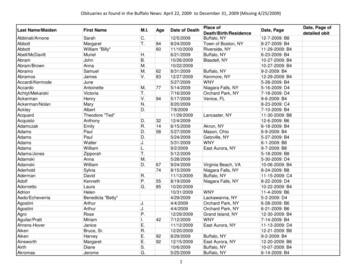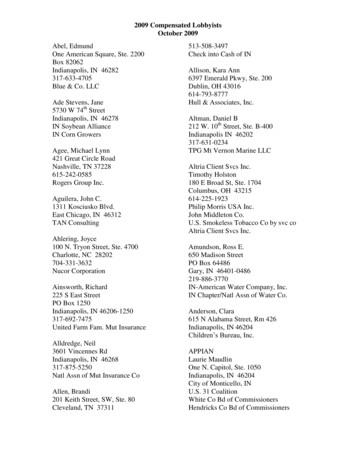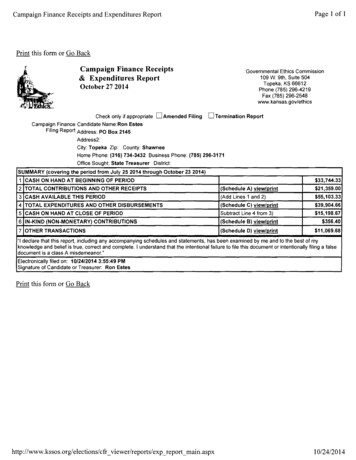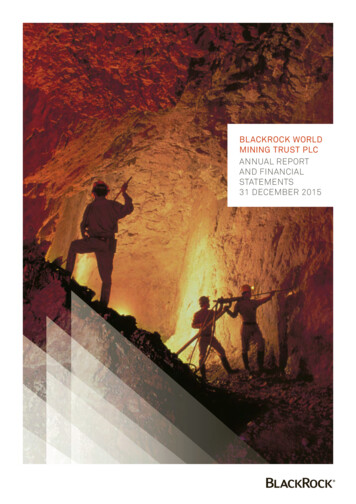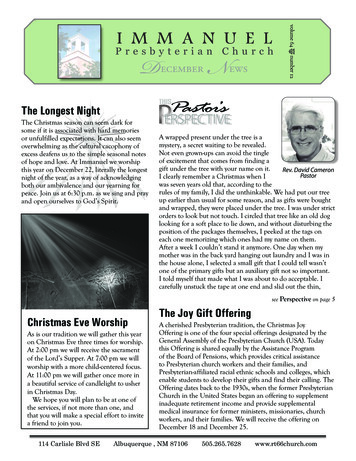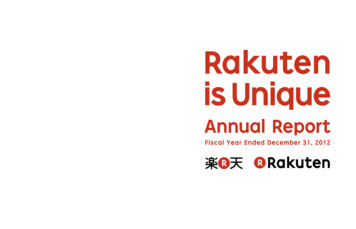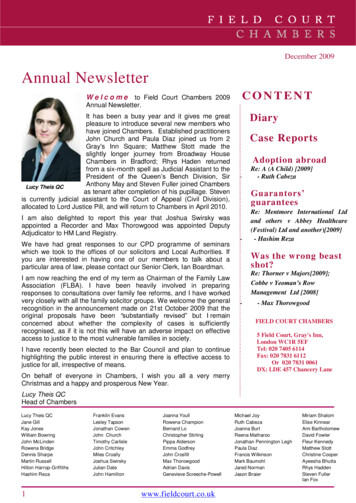
Transcription
December 2009Annual NewsletterCONTENTW e l c o m e to Field Court Chambers 2009Annual Newsletter.It has been a busy year and it gives me greatpleasure to introduce several new members whohave joined Chambers. Established practitionersJohn Church and Paula Diaz joined us from 2Gray's Inn Square; Matthew Stott made theslightly longer journey from Broadway HouseChambers in Bradford; Rhys Haden returnedfrom a six-month spell as Judicial Assistant to thePresident of the Queen‟s Bench Division, SirAnthony May and Steven Fuller joined ChambersLucy Theis QCas tenant after completion of his pupillage. Stevenis currently judicial assistant to the Court of Appeal (Civil Division),allocated to Lord Justice Pill, and will return to Chambers in April 2010.I am also delighted to report this year that Joshua Swirsky wasappointed a Recorder and Max Thorowgood was appointed DeputyAdjudicator to HM Land Registry.We have had great responses to our CPD programme of seminarswhich we took to the offices of our solicitors and Local Authorities. Ifyou are interested in having one of our members to talk about aparticular area of law, please contact our Senior Clerk, Ian Boardman.I am now reaching the end of my term as Chairman of the Family LawAssociation (FLBA). I have been heavily involved in preparingresponses to consultations over family fee reforms, and I have workedvery closely with all the family solicitor groups. We welcome the generalrecognition in the announcement made on 21st October 2009 that theoriginal proposals have been “substantially revised” but I remainconcerned about whether the complexity of cases is sufficientlyrecognised, as if it is not this will have an adverse impact on effectiveaccess to justice to the most vulnerable families in society.I have recently been elected to the Bar Council and plan to continuehighlighting the public interest in ensuring there is effective access tojustice for all, irrespective of means.Diary-Case ReportsAdoption abroad-Re: A (A Child) [2009]- Ruth CabezaGuarantors’guarantees-Re: Mentmore International Ltdand others v Abbey Healthcare(Festival) Ltd and another)[2009]- Hashim RezaWas the wrong beastshot?Re: Thorner v Majors[2009];Cobbe v Yeoman’s RowManagement Ltd [2008]-- Max ThorowgoodFIELD COURT CHAMBERS5 Field Court, Gray's Inn,London WC1R 5EFTel: 020 7405 6114Fax: 020 7831 6112Or 020 7831 0061DX: LDE 457 Chancery LaneOn behalf of everyone in Chambers, I wish you all a very merryChristmas and a happy and prosperous New Year.Lucy Theis QCHead of ChambersLucy Theis QCJane GillKay JonesWilliam BowringJohn McLindenRowena BridgeDennis SharpeMartin RussellHilton Harrop-GriffithsHashim Reza1Franklin EvansLesley TapsonJonathan CowenJohn ChurchTimothy CarlisleJohn CritchleyMiles CroallyJoshua SwirskyJulian DateJohn HamiltonJoanna YoullRowena ChampionBernard LoChristopher StirlingPippa AldersonEmma GodfreyJohn CrosfillMax ThorowgoodAdrian DavisGenevieve Screeche-Powellwww.fieldcourt.co.ukMichael JoyRuth CabezaJoanna BurtReena MatharooJonathan Pennington LeghPaula DiazFrancis WilkinsonMark BaumohlJared NormanJason BraierMiriam ShalomElise KinnearAmi BartholomewDavid FowlerFleur KennedyMatthew StottChristine CooperAyeesha BhuttaRhys HaddenSteven FullerIan Fox
DIARYBon voyage!The Large Pension Room at Gray‟s Inn hosted aretirement party for Michael Clark on 4th February.A huge gathering enjoyed a heartfelt speech ofthanks from Lucy Theis QC to Michael forproviding Chambers with many years of dedicatedservice.Quiz nightsBung Hole Cellars on High Holborn witnessed twofun quiz nights on 23rd April and 12th November.Eight teams delved into excellent wine beforetackling questions such as: “What is the capital ofSouth Australia?” and “What R&B band was RobertBell a member of?” On the first night, victory went to“Brainless of Brent” (Burrows) following a tie-breakwith “Blaser Glory” (aka Blaser Mills). They werefollowed closely by “Mullies Marvels” (MossBeachley Mullem & Coleman). The second nightsaw Hammersmith and Fulham as winners closelyfollowed by Blaser Mills. The star of the show thatnight was Lesley Tapson.Charity highlightsThe sun shone over London on the 12th July as20,000 runners headed for Hyde Park Corner forthe start of the “Asics London 10km” joined by aplucky team from Chambers, plus special guests.Ian Boardman’s knee-defying time of 45min 25secis there to be beaten next year. The team raised 1,000 the children‟s charity Reunite. Chambershosted a well attended Christmas Choral Eveningwith festive music in the Large Pension Room on 9thDecember. Donations went to Great OrmondStreet and Solace Women’s Aid.For further information on the topics covered bythe newsletter please contact Sabina Smith:Sabina.smith@fieldcourt.co.ukTel: 020 7025 0312For information on seminars and events pleasecontact: Ian Boardman:Ian.boardman@fieldcourt.co.ukTel: 0207 405 6114final match of the season and runs flowed freely inboth innings. A nail-biter was on the cards butfading light and an approaching thunderstormforced the captains to call an honourable draw andhead for the bar.Sharp shootersChambers‟ Netball team had its first tip-off on 5thNovember. Quick hands, nimble feet and dead-eyeshooting by Oliver Fisher star Fiona Mellon madefor a great match with Oliver Fisher winning 11:6. Are-match is arranged.Finally the footieA well played match against BP Collins on 24thNovember resulted in a 10:8 win for Chambers. Thetwo teams pose for a group photo below.Bowled overThis summer‟s Ashes ended in glorious victory forEngland but alas, the second most coveted prize incricket, the Golden Box, left the Clerks‟ room afterthe annual fixture with TLT on 17th June resulted ina narrow defeat for Chambers. One week later, anexperienced team from BP Collins played someexcellent cricket to inflict our second defeat of theseason. Amends were made against Hodders inJuly with special mention going to Ruth Cabeza forbowling an excellent final over in a tense finish.Payne Hicks Beach provided opposition for the2From Left to Right: Andrew Clisold, Simon Deans, AlexZachary, Craig Williams, Tim Constable, Alex Jones, StevePerry, Chris Stirling, Michael Joy, Jonathan PenningtonLegh, Max Thorowgood, Rhys Hadden, Ian Boardman,Lawrence Cannell.www.fieldcourt.co.uk
CASE REPORTSProspective adopters who live abroadRe: A (A Child) [2009] EWCA Civ 41This case considered how thelaw can facilitate a child‟sadoption by likely adopters wholive outside this jurisdiction.English law does not permit thecasual movement of childrenout of this country for thepurpose of adoption overseas.Section 84 of the Adoption andChildren Act 2002(ACA 2002)does, however, facilitate theRuth Cabezalawful removal of children fromthe UK for the purpose ofadoption overseas and provides for the making ofan order granting parental responsibility toprospective adoptive parents and extinguishing it inevery other person. An application for a conventionadoption can be made in this country by a personhabitually resident in a country that has adopted theConvention on Protection of Children and Cooperation in respect of Intercountry Adoption and itis suggested that the principals set out in relation tos.84 applications apply equally to the interpretationof s.42 ACA 2002 as amended by regulations forthe purpose of convention adoptions.The backgroundA care order was made in relation to child A inJanuary 2007. The authority's plan was adoption.The only family members considered viableadopters were a paternal uncle and aunt, Mr andMrs N, who lived in the USA.The authority put forward a plan which involved, ata preliminary stage, the child travelling to the USAand living with Mr and Mrs N for the purposes of aninvestigation and assessment of their suitability aspotential adopters.Section 85 of the Adoption and Children Act 2002(ACA 2002) makes it an offence to remove a childfrom the UK „for the purpose of adoption‟ unless theprospective adopters have been granted parentalresponsibility under s. 84. However, paragraph 19of Schedule 2 of the Children Act 1989 (CA 1989)enables local authorities to apply to the Court forpermission to arrange for a child in their care to live3outside England and Wales (and so to avoid thesanction imposed by s. 85 ACA 2002) but not if thelocal authority is placing a child abroad for adoptionwith prospective adopters (paragraph 19(9)).A subsequent step in the plan was for Mr and Mrs Nto apply for parental responsibility under s. 84(4)ACA 2002, which requires that the child's home bewith the applicants at all times during the preceding10 weeks and, under s. 42, that the Court besatisfied that the local authority had had sufficientopportunities to see the child in the homeenvironment over that 10 week period. Mr and MrsN were able to make a short visit to the UK butcould not remain here for the 10 weeks before theplanned application and so it was proposed thatsome of the 10 week period be spent in the USA.The authority sought an order approving theremoval of the child to the US under paragraph 19of Schedule 2 to CA 1989 and a declaration thatthere was no bar to it taking account of the periodthe child would spend in the USA for the purpose ofs. 84(4) of ACA 2002.At the hearing before Charles J, now reported asHaringey London Borough Council v MA, JN, IA at[2008] 2 FLR 1857, the Department for Children,Schools and Families, an intervener, argued thatpermission for a child to live abroad could not begiven because the placement would contravenes. 85 ACA 2002 and that approval could not begiven under paragraph 19 of Schedule 2 CA 1989because the authority would be placing the child foradoption with prospective adopters.The Department also argued that no part of the 10week period referred to in s 84(4) could be spentabroad.Charles J found that permission could be lawfullybe given under paragraph 19 and that the „home' forthe purposes of ss 84(4) and 42(7) (a) did not haveto be in the UK. However, because of conflictingHigh Court authority in the form of Plymouth CC vCR and others reported, 13 June 2006 consideredand ECC v M and others [2008] EWHC 332 he feltunable to make the requested order and, instead,gave leave to appeal.Court of Appeal held:The judgments of the Court of Appeal were aresounding vindication for the local authority, asthey endorsed the analysis of the law at firstinstance, and go so far as to state that even withoutthe exonerating effect of Sch 2, para 19(6) it waswww.fieldcourt.co.uk
unlikely that the local authority plan fell foul of s 85. Permission could lawfully be given under paragraph19 of Schedule 2 to Children Act 1989 for an authorityto arrange for a child to live outside the UK for thepurposes of an investigation and assessment ofwhether adoption abroad by the persons with whomthe child was to live would be the most appropriatewelfare solution throughout his or her childhood. The „home' for the purposes of s.84(4) and s. 42(7)(a)did not have to be in the UK.The judgment means that adoption of children byfamily members who live abroad is possible, but itremains difficult. Each case must be considered onits merits. The fact that the Court accepted that 10weeks referred to in s.84(4) did not have to bespent in the jurisdiction of the Court was only part ofthe overall successful outcome for this little girl. Theother reasons lay in the careful and practicalplanning which the London Borough of Haringeyinvested in her future.A was lucky. Her relatives could visit the UK for ashort period. For some children it is not possible forrelatives to visit the UK. For them, this case will notprovide relief. Their situation can only be assistedby the introduction of regulations under s. 86 ACA2002. DFCS confirmed at the appeal hearing that itis consulting in relation to the possibility of makingregulations under this provision.Back to contentGuarantors’ guaranteesMentmore International Ltd and others vAbbey Healthcare (Festival) Ltd and another[2009] All ER (D) 175 (Aug)The key issue for the court todetermine in this case, in whichHashim Reza represented theclaimants, was whether the firstdefendant had realistic prospectsof defending the claimants'complaint that it had failed to useits best endeavours to procure arelease of guarantors' personalguarantees.Hashim RezaThe backgroundThe first claimant was the seller, under a sale andpurchase agreement, of the entire issued sharecapital in six companies. The first defendant wasthe buyer under the contract. The second defendantwas the first defendant's sole director. The second4to fourth claimants all claimed to be entitled to thebenefit of obligations undertaken by the firstdefendant in the sale and purchase agreement inrespect of certain bank guarantees which they hadgiven in respect of the companies, and they soughtthe specific performance of those obligations.Pursuant to the sale and purchase agreement,cl 5.4 provided, inter alia, that the first defendantshould undertake to procure the release of theguarantors from guarantees made on behalf of thecompanies and, pending such a release, undertaketo indemnify the guarantors for any amounts paidby them. The claimants then issued proceedings forsummary judgment on certain aspects of its claim.HeldA party with an obligation to use best endeavourshad to take all the steps in its power which werecapable of producing the desired result which aprudent determined and reasonable person, actingin his own interests and desiring to achieve thatresult would take (see [25] of the judgment).On the evidence, the first defendant had no realisticchance of defending against the claimants'contentions that it had failed to use its bestendeavours to secure the release of the guarantors.IBM United Kingdom Ltd v Rockware Glass Ltd[1980] FSR 335 considered.Back to contentWas the wrong beast shot?Thorner v Majors [2009] UKHL 18; Cobbe vYeoman’s Row Management Ltd [2008] UKHL 55In the last two years the House ofLords has added fresh fuel to thefires which burn perpetuallybeneath the vexed questions of thenature of the common intentionconstructivetrustanditsrelationship to proprietary estoppel.In Stack v Dowden [2007] UKHL17, Baroness Hale and LordWalker‟s apparent willingness to impute intentions tothe parties to an alleged trust suggested a potentiallysignificant widening of the already diffuse doctrineswhich constitute the common intention constructivetrust in the „domestic consumer‟ context.Max Thorowgood.www.fieldcourt.co.uk
That impression was reinforced by the PrivyCouncil‟s decision in Abbott v Abbott [2007] UKPC53 in which Baroness Hale applied the „holistic‟approach to determining both the existence of abeneficial interest in property and its extent,although the Court of Appeal in Laskar v Laskar[2008] EWCA Civ 347 restricted the scope of thedomestic consumer context to purchases ofproperty, “as a home”.Having thus extended the common intentionconstructive trust, in Cobbe v Yeoman‟s RowManagement Ltd [2008] UKHL 55, the Houseappeared dramatically to reduce the scope of thedoctrine of proprietary estoppel in a commercialcontext.Mr Cobbe was an experienced property developerwho reached an oral agreement to purchase landfor 12m for development if planning permissionwas granted. Acting in the belief, activelyencouraged by the landowner, that the agreementwould be honoured despite both parties beingaware that it was binding in honour only, Mr Cobbeexpended significant effort, skill and money inobtaining planning permission only for thelandowner to withdraw and seek preferable termsonce planning permission was obtainedMr Cobbe succeeded at first instance and beforethe Court of Appeal on the basis that thelandowner‟s unconscionable behaviour gave rise toa proprietary estoppel and/or a constructive trustwhich prevented it from resiling from the bargain.In his leading judgment, with which Lords Hoffman,Brown and Mance agreed, Lord Scott stated thefollowing important points of principle:1Proprietary estoppel is a sub-species ofpromissory estoppel which becomes proprietaryif an estoppel is invoked in support of aproprietary claim.235A claim of proprietary estoppel cannot befounded on unconscionable behaviour alone. Aproprietary claim and an answer to that claimbased upon some fact or facts which thedefendant is to be debarred from asserting arerequired.The proprietary claim must be to “a certaininterest in land”.4In his obiter view, no proprietary estoppel coulddisplace the clear requirements of s. 2(1) Lawof Property (Miscellaneous Provisions) Act1989 that an agreement for the disposition ofan interest in land be in writing.Mr Cobbe did not assert that the agreement wasenforceable, therefore, the landowner could not beestopped from denying those facts. Further, hisinterest was merely an expectation that a bindingagreement for the sale of the land, including all therelevant terms, would be concluded following thegrant of permission; not a certain interest in land soMr Cobbe‟s claim to a declaration as to the extentof his interest in the property on the basis of eitherproprietary estoppel or constructive trust failed.Lord Walker also allowed the appeal and dismissedMr Cobbe‟s claims but on a narrower basis that incommercial circumstances where both partiesunderstood that their agreement was not bindingthe landowner‟s conduct, although unattractive,could not be castigated as unconscionable.Since it was handed down commentators, includingthe first instance judge Sir Terence Etherton in arecent lecture to the Chancery Bar Association,have been prophesying that the decision in Cobbeeither spelt an end to the doctrine of proprietaryestoppel as we know it, or that it would be „confinedto its own particular facts.‟ Lord Justice Etherton,further suggested that in choosing to restrict themore precisely defined and flexible doctrine ofproprietary estoppel rather than the will‟o-the-wispwhich is the common intention constructive trust,the House of Lords, “shot the wrong beast”.The judgments of Lords Walker and Neuberger inthe House of Lords‟ most recent contribution to thedebate, Thorner v Majors [2009] UKHL 18 handeddown on 25th March 2009, suggest that fears ofproprietary estoppel‟s demise have beenexaggerated. Indeed, Lord Walker, in giving theleading judgment, was at pains to emphasise boththat neither party to the appeal had suggested thatthe doctrine of proprietary estoppel had been,“severely curtailed or even virtually extinguished”.In Thorner the Claimant had worked for a numberof years on the deceased‟s farm without pay inreliance upon a small number of obliquewww.fieldcourt.co.uk
assurances that “the farm” would be his despiteother opportunities being available to him which hedid not take up.„The Stuffing of Minerva‟s Owl,‟ Lord Neubergersaid about the section 2 point:“ it is only fair to acknowledge that Lord Scott‟sapproach was consistent with a number of previousCourt of Appeal decisions, including ones to whichLord Walker and I were parties – Yaxley v Gotts [2000]Ch 162 and Kinane v Mackie-Conteh [2005] EWCA Civ45. However, in agreement with the Court of Appealand Etherton J in Cobbe v YRML, I suggest thatsection 2 has nothing to do with the matter. In casessuch as those in Crabb v Arun and Thorner v Majors,the estoppel rests on the finding that it would beinequitable for the defendant to insist on his strict legalrights. So the fact that, if there was a contract, it wouldbe void is irrelevant: indeed the very reason formounting the proprietary estoppel claim is that there isno enforceable contract. I accept of course that it is notopen to a claimant to take the unvarnished point that itis inequitable for a defendant to rely on the argumentthat an apparent contract is void for not complying withthe requirements of section 2. But where there is thesuperadded fact that the claimant, with the consciousencouragement of the defendant, has acted in thebelief that there is a valid contract, I suggest thatsection 2 offers no bar to a claim based in equity.”The trial judge held that both the deceased and theClaimant were of naturally taciturn dispositions andthat, viewed in context, the assurances weresufficiently unequivocal to entitle the Claimantreasonably to rely upon them.The Court of Appeal allowed the Defendants‟appeal on the basis that the trial judge had failed toconsider whether the assurances had been madewith the intention of persuading the Claimant toalter his position, rather than merely as statementsof present intention.In the House of Lords the Defendants sought touphold the Court of Appeal‟s decision both inrelation to the sufficiency of the assurances and onthe ground that Cobbe had strengthened or reemphasised the requirement that the proprietaryinterest claimed be certain and that that could notbe demonstrated because the extent of the farmhad fluctuated considerably over the period .The House of Lords allowed the appeal.As to the certainty of the interest claimed, LordWalker said that the relation of the estoppel to aspecific interest in the Defendants‟ land was thedistinctive feature of proprietary estoppel but notedthat Lord Kingsdown in Ramsden v Dyson (1866)LR 1 HL129 accepted that an equity could ariseand be satisfied despite a degree of uncertainty asto the interest claimed. There was no realuncertainty as to the identity of “the Farm”.The decision is also interesting for its endorsementof the judgment of Hoffman LJ in Walton v Walton(14th April 1994 Unreported) to the effect that,unlike a contract, the inevitable uncertainties andunspoken qualifications of oral, non-contractual,assurances need to be considered retrospectivelyfrom the point at which the promise falls to beperformed. At that point the question is: whether, inthe circumstances which have actually happened, itwould be unconscionable for the promise not to bekept.In his „obiter‟ remarks to the London Common Lawand Commercial Bar Association in July entitled,6Conclusion1. The commercial and domestic consumercontexts are to be sharply distinguished dproprietaryestoppels.2. The Gillett v Holt [2001] Ch 210 and Pallantv Morgan [1953] Ch 43 equities arefounded in the doctrines of proprietaryestoppel and now have the imprimatur ofthe House of Lords.3The courts are unlikely to hold that aproprietary estoppel could be prayed in aidto defeat s. 2(1) Law of Property(Miscellaneous Provisions) Act 1989.4The quality of the assurance said to founda proprietary estoppel is highly sensitive tothe context in which it is given. Itsenforceability will be assessed when it fallsto be performed and depend upon all theevents which have happened the issuebeing whether it would be conscionable forthe promisor to resile.www.fieldcourt.co.ukBack to content
Perry, Chris Stirling, Michael Joy, Jonathan Pennington Legh, Max Thorowgood, Rhys Hadden, Ian Boardman, Lawrence Cannell. For further information on the topics covered by the newsletter please contact Sabina Smith: Sabina.smith@fieldcourt.co.uk Tel: 020 7025 0312 For information on seminars and events please contact: Ian Boardman:
